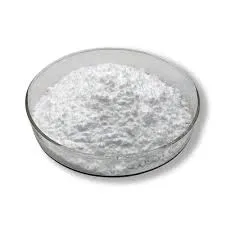
Nov . 27, 2024 21:02 Back to list
Hydroxypropyl Methyl Cellulose Suppliers for High-Quality Industrial Applications and Products
The Role of Hydroxypropyl Methyl Cellulose Manufacturers in Various Industries
Hydroxypropyl Methyl Cellulose (HPMC) is a versatile cellulose ether that has become essential across various industries due to its unique properties. Manufacturers of HPMC play a crucial role in producing this cellulose derivative, catering to the diverse needs of sectors such as pharmaceuticals, food, cosmetics, and construction. This article explores the significance of HPMC manufacturers, the applications of HPMC, and the factors influencing its production.
Understanding Hydroxypropyl Methyl Cellulose
HPMC is a modified natural polymer derived from cellulose, a primary component of plant cell walls. The modification process involves the substitution of hydroxyl groups in cellulose with hydroxypropyloxyl and methoxy groups. This alteration enhances the solubility and functionality of the polymer, making it suitable for various applications.
One of the primary characteristics of HPMC is its ability to dissolve in cold water, which allows for easier processing and application in formulations. Moreover, it acts as a thickener, binder, film-forming agent, and stabilizer, contributing to diverse functionalities in products across multiple industries.
Key Industries Utilizing HPMC
1. Pharmaceuticals In the pharmaceutical industry, HPMC is widely used as an excipient in drug formulations. It aids in controlled-release applications, enhancing the bioavailability of medications. HPMC can also serve as a coating material for tablets, providing protection against environmental factors while controlling the release of active ingredients. The demand for HPMC in pharmaceuticals has been rising due to the increasing focus on patient compliance and the development of new drug delivery systems.
2. Food Industry HPMC is regarded as a food additive, classified as E464 in the European Union. It serves multiple functions, including acting as a thickener, emulsifier, and stabilizer in food products. Manufacturers supply HPMC to the food industry for applications in sauces, dressings, and dairy products, where it helps maintain texture and consistency. With the growing trend of plant-based and gluten-free foods, the demand for HPMC as a natural alternative to traditional additives has surged.
hydroxypropyl methyl cellulose manufacturer

3. Cosmetics and Personal Care In the cosmetics sector, HPMC is valued for its film-forming and thickening properties. It is commonly used in shampoos, conditioners, creams, and lotions, where it enhances texture, stability, and application. Furthermore, as consumers demand clean-label products, HPMC's natural origin has made it a suitable choice for formulators aiming to meet these requirements.
4. Construction The construction industry utilizes HPMC as a polymer additive in mortars, plasters, and tile adhesives. Its water-retention properties improve workability and ensure long-term adhesion, making it a preferred choice for construction materials. Manufacturers of HPMC cater to this market by providing products tailored to specific building applications, enhancing performance and durability.
Factors Influencing HPMC Production
Several factors impact the production of HPMC, including the source of cellulose, the modification process, and the market demand. The choice of cellulose source influences the quality and properties of the HPMC produced. Manufacturers often use wood pulp or cotton cellulose, with sustainable sourcing practices being increasingly prioritized to meet environmental standards.
The production process involves precise control over parameters such as temperature, pH, and reaction time to achieve the desired degree of substitution and viscosity. Advanced technology and research into novel production methods continue to enhance the efficiency and quality of HPMC manufacturing.
Market demand also plays a crucial role in driving HPMC production. As industries evolve, manufacturers must adapt to changes in regulations, consumer preferences, and technological advancements. The rise of green chemistry and sustainability has urged HPMC manufacturers to explore eco-friendly practices in their production processes.
Conclusion
Hydroxypropyl Methyl Cellulose manufacturers significantly contribute to numerous industries by providing a versatile and functional polymer that enhances product quality and performance. The ongoing growth in sectors like pharmaceuticals, food, cosmetics, and construction underscores the importance of HPMC and its manufacturers. As innovation and sustainability become guiding principles, the future of HPMC production holds promising avenues for growth and application, ensuring that manufacturers remain pivotal in shaping a wide array of products that consumers rely on daily.
-
HPMC for Tile Adhesive: Superior Bonding & Workability
NewsAug.30,2025
-
Premium Cellulose Ether: Effective Liquid Thickener Solutions
NewsAug.29,2025
-
HPMC for Tile Adhesive: Enhanced Bonding & Workability
NewsAug.28,2025
-
tile-bonding-additives-for-stronger-bonds
NewsAug.22,2025
-
construction-grade-rdp-for-wholesale-needs
NewsAug.22,2025
-
trusted-hec-supplier
NewsAug.22,2025







